Hydrogen Fuel Station
The future of transportation is here, and it runs on hydrogen. Like Hydrogen fuel station or hydrogen fuel cell. With a hydrogen fuel station, you can fill up your car with this clean-burning energy source and hit the road. Not only is hydrogen fuel Station ecological friendly, but it’s also more efficient than gasoline. That means you can save money on fuel costs while doing your part to protect the planet. If you’re thinking about making the switch to a hydrogen fuel station, here’s what you need to know.
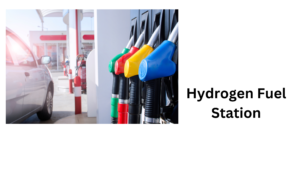
Hydrogen Fuel Station
What is Hydrogen Fuel station ?
Hydrogen fuel stations are few and far between. In order to increase the number of stations, government motivations are in place in some countries. The benefits of having a hydrogen fuel station close by are many.
For one, it’s a clean source of energy. Unlike gasoline or diesel, which release Carbon dioxide and other pollutants into the atmosphere, hydrogen fuel cells emit only water vapor.
Another benefit is that hydrogen fuel station is more efficient than gasoline or diesel. A gallon of gasoline contains about 33 kilowatt-hours (kWh) of energy, while a gallon of hydrogen contains about 39 kWh. That means a car using gasoline will get about 33 miles per gallon, while a car using hydrogen will get about 39 miles per gallon.The cost of hydrogen fuel is another advantage. While the price of gasoline has been rising in recent years, the cost of hydrogen has been falling. In some parts of the world, it’s now cheaper to fill up with hydrogen than it is with gasoline.
Finally, hydrogen fuel cells have a much longer lifespan than batteries, making them a more viable option for long-term use. A typical battery needs to replace after about 1,500 charges, while a hydrogen fuel cell can last for up to 20,000 hours of use.
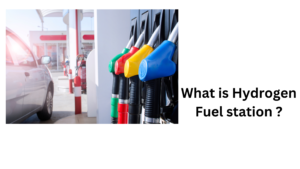
What is Hydrogen Fuel station?
How Hydrogen Fuel Station made ?
A H2 fuel station is usually made up of a hydrogen production plant, a compressor station, and a hydrogen storage tank.The hydrogen production plant produces hydrogen gas from water and other renewable resources. The compressor station compresses the gas so that it can be store in the storage tank. The storage tank is usually made of metal or glass, and it stores the gas under pressure.
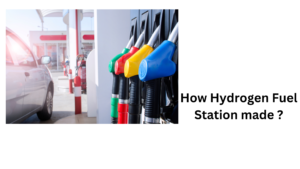
How Hydrogen Fuel Station made ?
How Hydrogen Fuel Station Work ?
A hydrogen fuel station is a fueling station that dispenses hydrogen gas for vehicles. The gas is typical store in high-pressure tanks. To use the hydrogen fuel station, motorists drive up to a dispenser, which is similar to a gasoline pump. They attach a hose from the dispenser to their car and fill up their tank just like they would with gasoline.Hydrogen fuel stations work by using an electrolyzer to split water molecules into hydrogen and oxygen gases. The hydrogen gas is then compressed and stored in high-pressure tanks. When motorists come to fill up their cars, the gas is released from the tanks and pumped into the vehicle’s fuel tank.
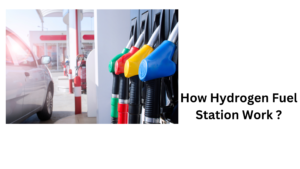
How Hydrogen Fuel Station Work ?
What is Hydrogen Fuel cell ?
Hydrogen fuel cells are devices that use a chemical reaction to produce electricity. The most common type of fuel cell uses H2 and oxygen to produce water and electricity.
Fuel cells are often use in applications where it is desirable to have a clean, efficient power source with no moving parts. Fuel cells can operate at extremely high efficiencies, and they can use to power a wide variety of devices, including auto mobiles, laptops, and cell phones.
One of the main advantages of fuel cells is that they produce very little pollution. Hydrogen fuel cells emit only water vapor and heat, making them one of the cleanest sources of energy available.
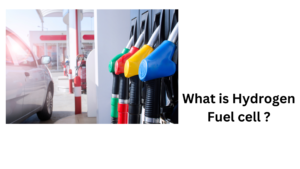
What is Hydrogen Fuel cell ?
How Hydrogen Fuel cell made ?
Hydrogen fuel cells are made by combining hydrogen and oxygen to produce electricity, with water as the only by-product. A fuel cell consists of an anode separated by an electrolyte. Hydrogen ions (H+) are drawn through the electrolyte from the anode to the cathode, where they react with oxygen molecules (O2) to produce water molecules (H2O).
Furthermore the chemical reaction that takes place in a fuel cell can be express as follows:
Anode: H2 → 2H+ + 2e-
Cathode: O2 + 4e- → 2H2O
Overall: H2 + O2 → 2H2O
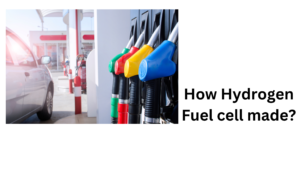
How Hydrogen Fuel cell made ?
How Hydrogen Fuel cell work ?
H2 fuel cells are unique in the way that they produce electricity. Rather than using a combustion process, like traditional fossil fuel power plants, fuel cells use an electrochemical reaction between H and O to produce electricity. This reaction occurs in the presence of a catalyst, typically platinum, which helps to accelerate the reaction.
Fuel cells can operate continuously as long as they have a constant supply of reactants (H and O). When used in applications, such as cars or buses, the reactants can store onboard the vehicle in pressurized tanks. In stationary applications, such as power generation for buildings or industrial facilities, the reactants can supply from an outer source, such as a natural gas pipeline or electrolysis plant.
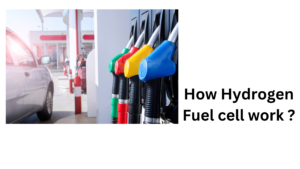
How Hydrogen Fuel cell work ?
How many Hydrogen Fuel stations are in USA ?
As of July 2018, there are 34 public H2fuel stations in the United States. Most are located in California, with 18 stations in the state. There are also three stations in Colorado, two each in Washington and Arizona, and one each in Illinois, Nevada, Oregon, Connecticut, New York, and Maryland.
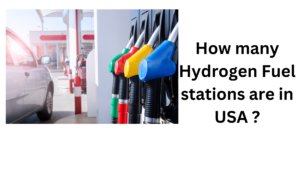
Fuel stations in USA
How much cost required to built Hydrogen Fuel station ?
Hydrogen Fuel station cost depends on many factors, such as the location of the station, the type of facility, the capa city of the station, and the equipment used. The average cost range for a small H station is between $1 million and $2.5 million.
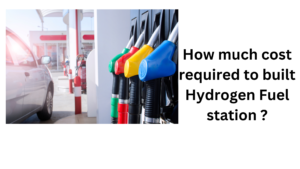
Cost required to built
Where and how many Hydrogen Fuel stations located ?
There are currently over 60 Hydrogen fuel stations in the United States, with most of them located in California. The majority of these stations are open to the public, with a few private stations exist as well. Moreover most H fuel stations are located near major highways, making them suited for long distance travel.
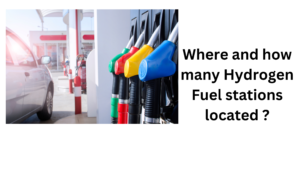
Where and how
What is the cost of 1 liter Hydrogen Fuel ?
The cost of 1 liter of H2 fuel can vary depending on the region and availabile fuel. In some areas, 1 liter of H2 fuel may cost as little as $0.50, while in others it may cost as much as $2.00. The average cost of 1 liter of H2 fuel is around $1.00.
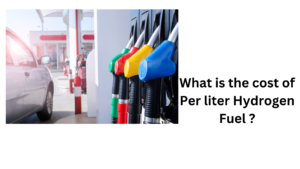
Cost of 1 liter
Benefits
Hydrogen Fuel station have advantage that they are extremely efficient in converting chemical energy into electrical energy. Traditional combustion-based power plants only have an efficiency of around 30-40%, whereas fuel cells can achieve efficiencies greater than 60%. Additionally, fuel cells do not release any pollutants into the environment – making them a very attractive option for clean energy generation.

Benefits
For more informative article visit this link:


